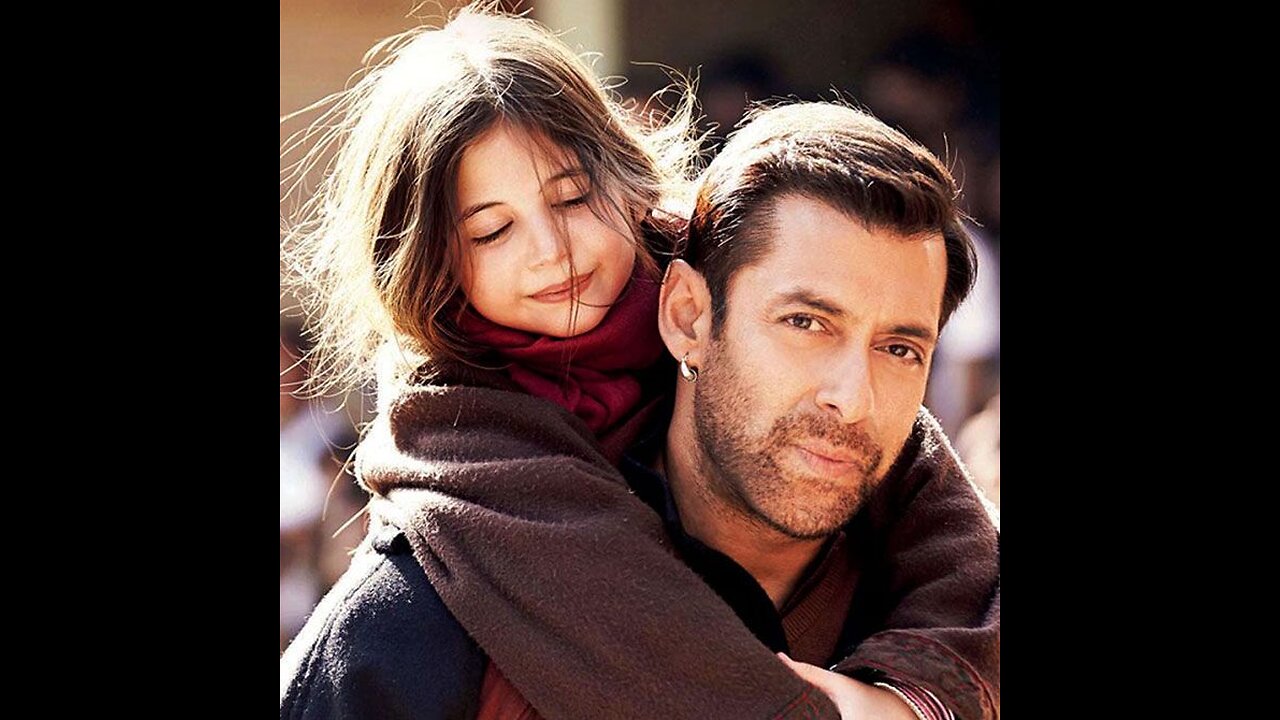Premium Only Content

HOLY SPIRIT OF INDIA ! = ACT 1 - SCENE 4 = BAJRANGI ! BRAVE & ADVENTUROUS MAN RETURNS PAKISTANI GIRL TO HER MOTHER !
This original composition ‹ Bajrangi › is inspired by the wonderful 2015 film ‹ Bajrangi Bhaijaan › - directed by Kabir Khan, featuring Salman Khan, Harshaali Malhotra, Nawazuddin Siddiqui, Nawazuddin Siddiqui, …
It is the story about an Indian man, with a magnanimous heart, who takes a young mute Pakistani girl - whose mother lost her while falling asleep during a train ride in India, back to her homeland, to reunite her with her mother and family.
In trying to discover the girl's parents, this good man, named Bajrangi, develops an unshakable bond with her.
Through a series of adventures and misadventures, this charming story captures the hearts of all good people, ready to take on the noble mission of protecting children, and reuniting them with their parents.
Beautifully shot, capturing the breathtaking mountains and valleys of Kashmir, and the lush plains and arid deserts of norther India and Pakistan, ‹ Bajrangi Bhaijaan ›’s action begins, once upon a time, in the hills of Sultanpur, Jhelum, Pakistan, where there lives an adorable little six-year-old mute girl, named Shahida.
One afternoon, Shahida is playing on a hill, when she accidentally falls off it into a ravine.
When she doesn’t return home by the end of the day, the villagers organize a search party.
After hours of searching, they find the little girl on a branch protruding from the hill. She had been stuck on it for the entire day but couldn’t call for help because of her vocal disability.
The following morning, her parents and neighbors discuss what must be done to help her.
An elder man suggests they take her to the shrine of a holy Sufi, Nizamuddin Auliya, in Delhi, India.
The religious family believes that a visit to the holy shrine will bring peace and happiness; and most importantly, they pray that such a journey to a holy site may restore Shahida’s speech.
Shahida’s father used to be in the military, where he had fought for Pakistan against the Indian army. Therefore, he is sure that he will not be granted a visa to India.
For this reason, her mother Razia takes it upon herself to travel far from the village, for the first time, without any other family member, but her mute daughter, Shahida.
The trip goes well as planned for the most part. The two reach the shrine, pray and make offerings to the holy Sufi’s spirit, and then get back on a train for the return trip to their home country of Pakistan.
On the return journey, however, the train unexpectedly stops for repairs at night.
While everyone is asleep, Shahida notices a sheep stuck in a pit right outside the train. She doesn’t think twice about going outside to help and save the little lamb for its ordeal.
But while Sahida is tending to the little lamb, suddenly, the train restarts before she can return to her mother. The little girl runs towards the train desperately trying to board it, but she is eventually left behind, all alone in the night.
In a desperate attempt to go after her mother, Shahida boards another freight train, going in the same direction.
But to her dismay, the rain soon reverses directions, in the opposite direction her mother had taken, and eventually stops in the town of Kurukshetra, in the Indian state of Haryana.
When her mother, Raiza, much to her dismay and bewilderment, notices that her daughter is missing, she stops the train.
Policemen are appointed to look for the girl around the railroad tracks, where she was lost.
However, they cannot find her since Shahida had taken another train in a different direction, and had thereby already reached a totally different place.
Raiza meets her husband and tells him about the disappearance of their daughter, he gets worried to death about finding her again.
Alas, they cannot get an immediate visa back to India, much to their chagrin. The parents have no other way left to them, but to pray that their daughter is somehow still alive and safe.
Meanwhile, Shahida is now lost in a different country, in a foreign town, with no way to communicate with others, since she is mute.
During a religious celebration in town, she sees a stranger eating at a street-side restaurant.
The stranger is a kind, good-hearted, principled man, named Pawan Kumar Chaturvedi, and he generously invites the little lost girl to have a good meal with him.
After a few minutes of trying to get her to talk, Pawan realizes that the little girl is mute, and starts calling her Munni.
A starving ‹ Munni › finishes the food, and takes to following Pawan around. Assuming that she was separated from her parents during the festival, Pawan asks her to stay in front of a temple.
Pawan is a devout Hindu Brahmin, and an ardent devotee of Lord Hanuman. He believes that Lord Hanuman will take Munni home, if she stays in front of his temple.
But when Munni still doesn’t stop following him, he brings her to the police station.
Nevertheless, since she cannot tell them any details about her parents, the police can only wait for someone to file a missing child complaint.
But until her parents are found, Munni obviously needs a place to stay. Hence, Pawan takes her in. On his way to his home in Delhi, he tells Munni to call him Mama, if she ever talks in the future.
He also starts naming different Indian cities, asking her to nod if she knows what city her parents are in. All the passengers on the bus help him, but none of them name cities outside of India.
As they all talk to one another on the bus ride, Pawan tells everyone how he came to Delhi for work.
A flashback shows us the time he was in high school, when he was but an average student, who could never pass the final examination. All his friends cheated and went on with their lives, but Pawan refused to cheat or lie, being a true devotee of Lord Hanuman.
According to the legendary Hindu mythologies, Lord Hanuman, believed to be an avatar of Lord Shiva, manifested into this world as the mighty ape, who aided Lord Rama in his expedition against evil forces.
Lord Hanuman is one of the most popular idols in the Hindu pantheon. He is worshiped as a symbol of physical strength, perseverance, and devotion to help us face ordeals and conquer all obstacles. Hanuman is therefore also a symbol of success and fulfillment. One needs courage, strength, intelligence, commitment and purity to be successful. Hanuman gets courage and strength from his father, Kesari (Kesari means Lion), and intelligence and purity from his mother, Anjana.
Insofar as Pawan is concerned, after his bus ride reaches its terminus in Dehli, he goes to his home with Munni, where his fiancee, Rasika, happily receives them.
Rasika is glad that Pawan is helping a little girl in need, but her father, Pandey, doesn’t feel the same way. He is worried about the possibility that Munni belongs to a different religion.
Pawan rationalizes that she is Hindu because of her fair skin color, and persuades Pandey to let her stay for a month.
Munni cries every day, as she thinks about her parents back home, even though Pawan and Rasika treat her like their own daughter.
Since Rasika’s entire family is vegetarian, but Munni on the other hand is accustomed to eating meat with every meal, Munni hardly ever finishes her food.
One day, Pawan and Rasika find Munni no longer in their home, but in a Muslim neighbor’s home, devouring home-cooked chicken!
Pawan brings her to a restaurant that evening, and lets her eat whatever she likes, even though eating meat is against his religion.
Munni is very fond of the glittery bangles they sell on the street side. One day while walking down a market, she innocently picks up a pack of bangles before being stopped by the vendor.
Pawan makes her return it, and takes her to the temple to apologize to God for stealing. As he teaches her to join her hands, Munni sneaks into a Mosque nearby.
Pawan is hesitant to follow her inside but he does it anyway. To his utter surprise, he sees her reading the Quran in front of a shrine. For a few minutes, he feels like she betrayed him, because he would have never, alas until then, befriended a Muslim.
But Rasika makes him realize that she is a human before being Muslim. She dislikes the fact that her father discriminates against people because of their religion, and she wants Pawan to be different.
Pawan understands, and runs into the Mosque to get Munni. But by then, Munni has already left.
As he nervously looks around for her, Munni runs to him, and hugs him tightly. At that moment, he accepts her as his responsibility entirely, overcoming his irrational fear of going against his religion.
That night there is a cricket match opposing Pakistan and India, which the entire family watches television, cheering for India; except Munni who cheers when Pakistan scores.
When the Pakistani team wins the game, Munni dances and kisses their flag through the television scree.
Pawan approaches her, and asks Munni if she is from Pakistan.
After weeks of shaking her head to every Indian city, Munni finally nods yes.
Rasika’s father, Pandey, is furious. Being a Muslim was bad enough, but since the girl is from Pakistan, he can no longer allow her to stay at their home.
Pawan promises to hand her over to the Pakistani embassy the next day. However, the embassy worker cannot grant her a visa without a passport. In Munni’s case, they don’t even know her real name, so a visa allotment is all the more impossible.
To make matters worse, a riot takes place in front of the embassy, which then decides to close all visa processing for at least a month.
As a last resort, Pawan takes Munni to a travel agency at Pandey’s suggestion.
The travel agent promises to take the little girl to the other side of the border, and asks for a significant amount of rupees. Pawan and Rasika give up the almost all the money they had saved to purchase their own house, once married, in order to help Munni get back home to her parents.
The next day, Pawan reluctantly brings Munni to the travel agent’s office, and leaves her there with the agent, after a tearful farewell.
On his way home, Pawan notices a street vendor selling glittery bangles. He remembers that Munni liked them, and so he buys one for her. However, on returning to the travel agent’s office, he finds out that he has been tricked and cheated.
In fact, the malicious agent has taken the little girl to a brothel, and is about to sell the little girl into prostitution!
When he gets to the brothel, the otherwise composed Pawan loses his temper at the sight of the agent, counting the bills of money that he has just received from the brothel’s madam, in exchange for Munni.
Seeing red, Pawan throws the man out of the window, beats up all the madam’s henchmen, gets out with Munni on his back, and brings the little girl, whom he just saved from the clutches of very evil people, back home with him again.
Pawan then decides to bring Munni home himself.
Although he has no connections in Pakistan, nor any knowledge about Pakistani villages, and to the great sadness of Rasika, Pawan packs his bags and makes his way to the border with Munni at his side.
A few miles away from the border, in the desert, they meet a secret agent, named Ali, who illegally transports people to the other side of the border between India and Pakistan, through a tunnel hidden beneath the sand.
After listening to Munni’s story, Ali is moved, and agrees to take them over the border, or rather under, for free.
When Pawan and Munni reach Pakistan’s side of the border, Ali runs away for dear life, not wanting to be caught by the ferocious military border patrols.
But being a Lord Hanuman’s devotee, Pawan refuses to run away with Ali, without asking the guards for permission.
When the military patrol officers find Pawan, they beat him up, while Munni watches on, and silently cries.
Pawan pretends to laugh a little even while being beaten, so the little girl would not be afraid.
After finding out the reason for his travel, the head soldier asks him to feel free to do whatever he wants to in the following ten minutes, before they return for the next patrol round.
Sometime thereafter, Pawan and Munni leave the desert and rejoin civilization. While eating at a restaurant in town, Munni sees a cop’s handcuffs, and takes them, assuming they are some sort of bracelet.
But the cop soon finds out, and throws Pawan in jail, labeling him as an Indian spy, because of the lack of a passport.
A struggling journalist, named Chand Nawab, finds out about the alleged spy, and goes to the police station in order to interview him.
Nawab gets few and very vague answers from Pawan, and so he informs his media company that doesn’t take Pawan seriously.
Inside the police station, a cop interrogates Pawan, but refuses to believe anything he has to say.
Suddenly, Munni sees a picture on a table calendar, and she recognizes it as her village.
Pawan is overjoyed, until the policeman forcefully squeezes Munni’s cheeks, to make her open her mouth and speak up.
That’s too much for Pawan, who loses his temper and attacks the policeman, inviting more trouble for himself.
Pawan manages to defeat the chief of police and his other officers, and then runs away from the police, along with Munni.
Nawab sees them escaping, and follows them discreetly behind.
They board a bus, where Pawan shows the conductor their destination, and also tells him Munni’s story.
After finding out he is actually a good person, Nawab and the rest of the travelers decide to help him.
They hide him and Munni on the top of the bus when the police come looking for them.
At night, Nawab, Pawan, and Munni stay at a Mosque. A religious scholar, named Azad, also helps them, and he hides them from the policemen searching the entire city for the alleged spy.
One of Azad’s students sees « Switzerland », written on the picture that Munni thought was her village.
The group is back to square one …
After that, Azad dresses up Pawan and Nawab in a burqa and manages to send them outside the city without the police noticing.
Pawan, who was oblivious to Islam a few weeks ago, feels strange in such foreign, traditional clothing.
He apologizes to Lord Hanuman, but is ready to do anything for the sake of saving Munni and bringing her back to her parents.
For the next days, Pawan and Nawab take Munni to several different places, asking people if they know her. Nawab documents their journey and everything about Munni and Pawan’s relationship.
One evening, as the trio is reviewing the footage from their time at the mosque, Munni recognizes her mother in one of the clips !
They see her getting into a specific bus, and so they go to see the bus driver the very next day. The driver names all the villages that are along his daily route. One of them is Sultanpur, which Munni confirms is her home !
Nawab and Pawan hug, having finally found their destination.
Nawab also uploads the video documentary onto the Internet, but because of that the police get a hint of their location, and start chasing after them again.
On their way to Sultanpur, the bus is stopped at a checkpoint in the mountains. With no way out, Pawan decides to distract the policemen by running away in one direction, while Nawab and Munni can get away in another.
Indeed, while the policemen are busy trying to catch Pawan running down the mountain slope, Nawab takes charge of Munni, and succeeds in bringing her back to her village - where Munni run to her mother, who couldn’t be happier to see her.
But while Munni is reuniting with her family, Pawan is apprehended and gets beaten up badly by the furious police.
Meanwhile, the documentary on the internet goes viral, and bigger news channels start covering the story.
Eventually, people find out that Pawan is not a spy, and that he is cruelly being held unjustly in prison for the supposed crime of helping a little girl reunite with her mother and family.
Both the Pakistani people and the Indian people give him all their support.
But the Pakistani authorities refuse to let him go free. In their book, he broke the law, and resisted arrest. So they go on torturing him in prison, beating him up for hours, drowning him until his last breath, and starving him.
Nawab then gets onto a bigger televised platform, asking people to gather at the border, and ensure that Pawan is set free and is able to reach his home in India safely.
The plan works, and a multitude of people from both sides come to the border, in crowds of thousands.
Rasika and her family are also among the crowd, waiting for him on the Indian side of the border to come home to them.
Eventually, the authorities have to back down. The crowd erupts chanting Pawan’s name, as he crosses over the border again, but this time from Pakistan to India.
Munni is among the crowd on the Pakistan side of the border. She waves her arms and hands, desperately trying to catch Pawan’s attention. But because she is mute, she is unable to call out to him.
Then all of a sudden, a miracle occurs: Munni manages to shout out « Mama! » - the name Pawan wanted her to call him, when they first met.
The crowd goes silent, as Munni keeps shouting.
Pawan hears her, and turns around and sees her.
They run into each other’s arms for a big hug, in the center of the river between both fences of the border between India and Pakistan.
This is one of the most heart-endearing movies of all times; and I believe you will also find the spinoff it inspired me quite beautiful and heart-touching.
Sincerely,
Teri'irere Ito'arai
Film Composer
The Holy Spirit of India !
- - - - -
- - - - -
FAIR USE - Section 107 of the Copyright Act 1976
This is a non-profit video that I personally composed solely for the purpose of study, review, research, self-expression, experimental analysis, creative research, humorous contrasting, cultural and educational philosophy, and basically for the love of artistic creativity itself, without any intention for any commercial uses whatsoever, and fully and absolutely for non-profit public display.
This video is for educational purposes only; and is offered freely to the public.
In composing this audio-visual film video, I am respecting the Copyright Disclaimer Under Section 107 of the Copyright Act 1976, whereby allowance is made for fair use, for purposes such as criticism, comment, news reporting, teaching, scholarship and research.
Fair use is a use permitted by copyright statute that might otherwise be infringing.
Non-profit, educational, or personal use, thankfully tips the balance in favor of fair use, thus promoting both the original work and other possible creative derivatives.
I made use of images in this composition that do belong to other film and music production firms. However, such a composition is unique and original in its full assembly, and is for educational and non-profit purposes only.
The original film production images and original music melodies in this film remain the property and copyright of its rightful owner, or owners.
I claim no ownership whatsoever on any of the materials I have used in creating this new audio-visual composition, except those that are my own to improve the state-of-the-art, and that I offer freely to the public worldwide.
Sincerely,
Teri'irere Ito'arai
Film Composer
The Holy Spirit of India !
-
 7:24
7:24
Warren Smith - Secret Scholar Society
1 day ago1 Guy Causes Entire Mob of Protesters to Implode & Get Arrested
4957 -
 31:24
31:24
The Why Files
3 days agoSynchronicities | The Science Behind Your Meaningful Coincidences (STRIPPED)
12.7K42 -
 2:07:34
2:07:34
FreshandFit
4 hours agoWhy You Are Unhappy Dating!
33K8 -
 1:21:38
1:21:38
Badlands Media
21 hours agoDevolution Power Hour Ep. 367
81.6K20 -
 2:28:09
2:28:09
Tundra Tactical
3 hours ago $3.91 earned🔥 NFA Hypocrisy EXPOSED: the Senate Just Screwed Gun Owners (Again) | Tundra Nation Live Roast 🔥
25.2K3 -
 LIVE
LIVE
DLDAfterDark
3 hours ago $1.54 earnedDLD Live! Red Dawn Readiness! HPA & Short Act Updates - T Rex Arms - Guns Gear & God
877 watching -
 LIVE
LIVE
GamersErr0r
3 hours ago $0.49 earnedMarvel Rivals Booty Bandit | Ft. SnoopLion
178 watching -
 56:47
56:47
Man in America
10 hours agoMEP Christine Anderson EXPOSES the SINISTER Plan for Global Slavery—and How We FIGHT BACK
58.9K18 -
 LIVE
LIVE
BlackDiamondGunsandGear
4 days ago🔴 DLD After Dark w/ Redawn Readiness / They don’t care. They not gonna start now…
218 watching -
 46:55
46:55
The Connect: With Johnny Mitchell
14 hours ago $0.72 earnedInside A Mexican Sicario Training Camp: How The Jalisco New Generation Cartel Trains It's KILLERS
12.5K2